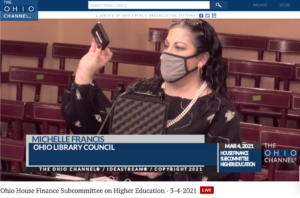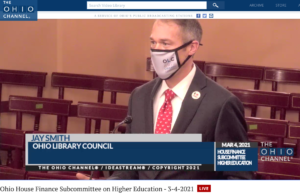OLC Testifies on State Budget Bill (HB 110)
OLC’s Executive Director Michelle Francis and Jay Smith, OLC’s Director of Government and Legal Services testified on House Bill (HB) 110, the biennial state budget bill, on Thurs., March 4 in front of the House Finance Subcommittee on Higher Education.

OLC’s Executive Director Michelle Francis shows the committee a WiFi hotspot and explains how libraries are bridging the digital divide in Ohio, especially during the pandemic.
Francis told lawmakers how public libraries were able to quickly pivot and adjust their service delivery models to continue to meet the needs of their local communities during the pandemic. Francis provided specific examples of what libraries did when the pandemic started and what they continue to do today, such as:
- curbside, drive-through and delivery service
- virtual storytimes
- one-on-one tech training
- assistance for homeschoolers and remote learners (and parents, too!)
- job search assistance
- and loaning Wi-Fi hot spots.
“Ohio’s public libraries recognized the need for broadband connectivity long before the pandemic,” Francis said. “We know that a significant number of Ohioans still lack access to this basic utility. In 2019, Ohioans utilized public library computers more than 12.7 million times and our Wi-Fi more than 23.9 million times. We know that the digital divide and the need for access to broadband connectivity is real – we have not only the anecdotal stories to prove it, but the statistical data to support it.”
In Governor DeWine’s state budget proposal released in February, he highlighted the work and importance of Ohio’s public libraries. However, the Executive Budget cuts state funding to Ohio’s public libraries by reducing the Public Library Fund (PLF) from 1.7% to 1.66% of the General Revenue Fund (GRF).
Smith explained that Ohio’s public libraries are looking for revenue stability in an effort to respond to the needs of Ohioans and the growing demand for services. He said that this is only possible with adequate funding.
“We would like to formally thank the General Assembly for your work over the last three budget cycles to begin to restore state funding to Ohio’s public libraries through the Public Library Fund, ” Smith said. “Unfortunately, it is those efforts that are now in jeopardy under the Governor’s proposal for FY22-23.”
Smith explained that the PLF is not a line-item appropriation like other programs and state agencies in HB 110. It is in permanent law and is a set percentage of the state’s monthly tax receipts that go into the GRF. He described how the PLF ebbs and flows each month depending on state revenues and that it is currently set in temporary law at 1.7% of the GRF for FY 2021.
Smith urged members of the Ohio House to keep the PLF at the current (FY21) rate of 1.7% because there are still several unknowns regarding Ohio’s economy and the budget process between now and June 30 that could impact the state’s GRF base and ultimately reduce the PLF.
“State funding through the PLF is critically important because it remains a primary source of revenue for public libraries. Statewide, more than 48% of the total funding for Ohio’s public libraries comes from the state through the PLF,” Smith said. “In addition, 20% of Ohio’s public library systems do not have a local property tax levy and rely solely on their state funding as their main source of revenue for day-to-day operations.”

Jay Smith explains how the “As Introduced” version of HB 110 would reduce state funding to Ohio’s public libraries to 1.66% of the state’s GRF. He urged the committee to keep the PLF at the current rate of 1.7%.
Smith explained that state funding for Ohio’s 251 public library systems will be reduced unless the budget is amended to keep PLF funding at current levels.
“Investing in public libraries is critical as the usage and demand for our services is growing and broadening – especially as we assist in Ohio’s recovery efforts, ” Smith said. “None of the services Michelle mentioned earlier would be possible without our state funding. Making public libraries a priority in this budget and maintaining the PLF at 1.7% is a step in the right direction.”
The testimony was covered live on the Ohio Channel and a video recording is available on the Ohio Channel website. [OLC testimony begins at the 1:26:30 mark]
A transcript of the testimony is also available on the OLC website.
More information is available at libraryfunding.olc.org.


